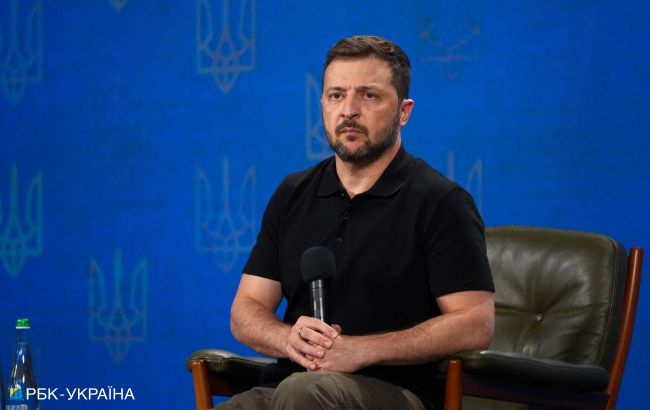Zelenskyy proposes to extend mobilization and martial law until February 2025
 Photo: President of Ukraine Volodymyr Zelenskyy (Vitalii Nosach, RBC-Ukraine)
Photo: President of Ukraine Volodymyr Zelenskyy (Vitalii Nosach, RBC-Ukraine)
Ukrainian President Volodymyr Zelenskyy proposed that the Verkhovna Rada approve the extension of martial law and general mobilization for 90 days, according to draft laws No. 12151 and 12152.
Draft No. 12151 proposes to approve the president's decree to extend the martial law from November 10, 2024, to February 7, 2025.
Draft No. 12152 suggests approving the president's decree to extend general mobilization.
Thus, martial law and mobilization will continue for nearly three years after Russia's invasion.
The Verkhovna Rada approved the president's decrees on martial law and mobilization on the morning of February 24, 2022, for a period of 30 days. Since then, the terms have been continuously extended, initially for one month, and from May 2022 for three months.
Duration of the war predictions
According to a survey by the Razumkov Center, in September 2024, 83% of respondents believe in Ukraine's victory in the war against Russia.
Among those who believe in victory, 39% think it will happen within 1-2 years, 19.5% believe it will occur by the end of this year, 15% estimate it will take 3 to 5 years, 5% say it will take more than 5 years, and 2% believe victory is unlikely to happen in their lifetime.
The most optimistic expectations for victory were noted in February-March 2023, when 50% believed that victory would come by the end of 2023.
In October, the IMF updated its baseline and negative scenarios for Ukraine's economy based on the duration and intensity of the war. According to the baseline scenario, the war is expected to end by the end of 2025. Previously, the IMF had anticipated its conclusion by the end of 2024.
The negative scenario envisions more intense combat and a conclusion to the war in mid-2026, which would result in a decline in the economy in 2025 and stagnation in the following years.
Martial law
During the period of martial law in the country, the following prohibitions and restrictions may apply:
- movement (travel abroad, document checks, curfews);
- the right to work and engage in entrepreneurial activities;
- the right to the confidentiality of correspondence and phone calls;
- the right to freedom of speech, media activities, and political parties;
- conducting elections and referendums.
General mobilization
The scope and sequence of mobilization in Ukraine are determined by the General Staff of the Armed Forces.
The following categories of military personnel are not subject to conscription during mobilization:
- those who have been reserved for the period of mobilization and wartime;
- those who have been deemed temporarily unfit for military service by a medical commission due to health reasons (for up to six months, subject to a repeat commission);
- men and women who are responsible for three or more children under 18 years of age;
- men and women who are sole caregivers for a child/children under 18 years of age;
- men and women who are raising a child with a disability in Group A under the age of 18;
- men and women who are responsible for a child with a disability (with III-IV degree functional impairments);
- men and women who are raising an adult child (18-23 years old) who has a disability of Group I or II;
- men and women who are guardians, adoptive parents, foster parents, or caregivers of orphans and children deprived of parental care (under 18 years of age);
- those who provide permanent care for individuals requiring assistance (if no other citizens can take on this care);
- members of parliament and deputies of the Supreme Council of the Autonomous Republic of Crimea.
Additionally, during the state of war, the following cannot be mobilized:
- students of vocational pre-higher and higher education, intern assistants, postgraduates, and doctoral candidates studying in full-time or dual forms of education;
- scientific and scientific-pedagogical workers of higher education institutions and vocational pre-higher education, research institutions, and organizations who hold academic titles and/or scientific degrees, as well as pedagogical workers of general secondary education institutions, provided they work in higher or vocational pre-higher education institutions, research institutions, and organizations, or general secondary education institutions for at least 0.75 of a full-time position;
- women and men whose close relatives (husband, wife, son, daughter, father, mother, grandfather, grandmother, or full or half siblings) were killed or went missing during the conduct of the Anti-Terrorist Operation (ATO) / Joint Forces Operation (JFO).

